With a grin that invites, a hairstyle that empowers and a verbiage that radiates experience, Frances-Anne Solomon has a peaceful air about her that’s hard to ignore. There’s a sense of pride that envelopes when she speaks about her Caribbean roots and the privilege she’s had in witnessing the CaribbeanTales International Film Festival (CTFF) reach its ninth year.
“When I started the festival there wasn’t a platform for Caribbean films and there wasn’t even a brand,” says Solomon, the founder of the CTFF. “They said, ‘why are you starting a Caribbean film festival?’ someone actually said to me, ‘it’s like a subgroup of a subgroup.’ I suppose they thought the main group was white, the subgroup was diverse. I don’t know what they were thinking.”
Her calm demeanor often shifts when she remembers these growing pains; they are moments that serve as a reminder in why creating a film festival that embodies the Caribbean culture is such a necessity.
“There was no appreciation of a brand, there was no sense of a brand,” says Solomon. “People say, ‘Oh I’m going to see an English film,’ there’s a sense of that. I’m going to see an Indian movie, but what’s a Caribbean film? Some people say I want to see something good assuming that we wouldn’t be making good movies. That was a huge obstacle to overcome, the fact that we didn’t have an audience.”
At an event set up to inform the media about the upcoming CaribbeanTales International Film Festival, the West Indian accents and personalities that personified much of the affair were aplenty. The venue itself seemed comparatively uniform with its government surroundings. While the Trinidadian Consulate of Toronto seemed fitting in name, it did little to match the West Indian irie’ness that already set a tone through its guests. Despite it all, it was made clear that Solomon in fact has reached her audience over the years.
It’s a movement that has been partly strengthened due to a consistent effort by CaribbeanTales to always strive to expand. This occurs through ongoing programs that expose audiences to uniquely Caribbean stories. Examples include a four-day market incubator program for new filmmakers, along with mentoring sessions meant to intermingle emerging artists with those in the know on a yearly basis. Another includes the forming of relationships such as the festival’s link with the Scotiabank Toronto Kiddie Carnival in providing more carnival-themed films. Forming liaisons with other festivals such as the Toronto International Film Festival has also played a key role. This is something Malinda Francis will be taking over as the new CTFF director, as she’ll focus on further building community partnerships to widen the scope of the festival throughout Toronto.
“I had thought I would not see this in my lifetime,” says Christopher Pinheiro, programming committee member and filmmaker. “I never thought I would see a burgeoning film industry in Trinidad and Tobago with a festival that’s becoming more and more well known and participated in. To see amazing stories being put on film coming out of young, middle aged and old filmmakers.”
Pinheiro has a jolly nature to him when he speaks about film in general, passionately going from one topic to another, while comically managing to provide his input on The Godfather 3. It’s easy to understand why he was chosen as a committee member.
“I’m really happy to hitch my wagon to her star as it were because of the vision. She’s put herself out there not only to start a festival where people could come and bring films, but also amazingly, to start distribution. Because it’s all well and good to get the film made, but then what do you do with it?”
The main goal has always been to provide a greater sense of awareness towards Caribbean film. It’s a shift that could plainly be seen in the young faces that dawned the red, white and black colours of Trinidad and Tobago, students who newly arrived from Solomon’s former school. The students stood amongst a mix of older to middle aged faces representing a varying of shades in respect to cultures. Everyone served as an appreciative audience that was uniquely Caribbean.
As the CTFF approaches its official commencement on September 3, media guests were reminded of a purpose that goes beyond simple recognition.
“The stories from the Caribbean Diaspora don’t exist much in the way how the world sees it,” says Nicole Brooks, incubator co-manager for the CTFF. “When they do see it they say, ‘Wow, you guys see the world in this way?’ Even stories of slavery being told by ourselves come from a different vantage point that people haven’t seen before, and that’s what is important.”
Festival screenings run from September 8, 10, 12 and 13 at The Royal Cinema, (608 College Street) in Toronto. The films will screen Monday, Wednesday and Friday at 6:30 p.m. and 9 p.m. and Saturday at 3:30 p.m., 6:30 p.m. and 9:30 p.m. For more information visit www.caribbeantales-events.com.
Words By. Noel Ransome + Photos By. Iris Gill


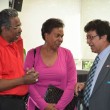


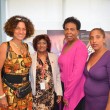

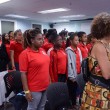

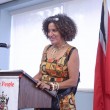
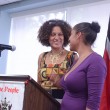


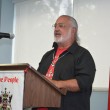









Comments are closed.